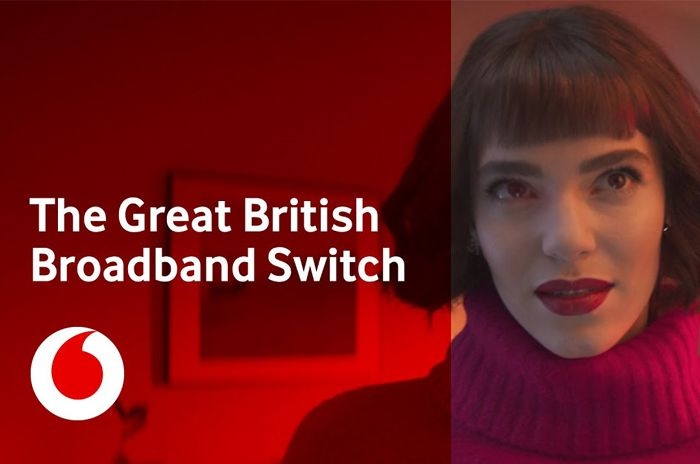Home > TV & Broadband > News > Vodafone not the 'same broadband' as BT, rules ASA
Vodafone not the 'same broadband' as BT, rules ASA
Vodafone has been slapped by the ASA for an advert stating their broadband was the 'same' as BT's broadband.
The Advertising Standards Authority (ASA) has ruled an advert published by Vodafone should not appear again due to being misleading and lacking substantiation.
Vodafone's ad claimed that BT customers could get "the same broadband" with them, which the ASA felt was not the case, despite both providers using the Openreach network.
They also came under fire for seeming to suggest that 'millions of BT broadband customers already had switched, or were actively considering switching' to Vodafone.

Same broadband for less
Vodafone ran a TV advert in March 2024 which stated, "millions of BT customers across the UK are realising they can switch to Vodafone and get the same broadband for less. That's right, the same broadband for less."
They also ran a paid-for X (twitter.com) advert on 8th April 2024, which said, "Get the same broadband technology for less when you switch from BT to Vodafone".
Vodafone's website also published claims that read, "Switch from BT to Vodafone and get the same broadband for less", as well as, "At Vodafone, we use the same technology as BT but we'll cost you less".
BT complained to the ASA that these claims were misleading and unsubstantiated because they believed, "Vodafone's broadband did not provide the same performance [as BT's]", and also that in regards to Vodafone's claim that "millions of BT customers across the UK are realising they can switch to Vodafone and get the same broadband for less", that they did not believe millions of BT customers had switched to Vodafone or were considering doing so.
The ASA upheld BT's complaints and banned the adverts in that form, including that they should not imply their broadband services provided a nearly identical performance to BT's service, or that millions of BT customers had or were thinking of switching to Vodafone.
The same, or different?
Vodafone's original advert, they say, was based on the fact they use the same underlying Openreach network to provide fibre-to-the-cabinet and full fibre broadband connections as BT does.
It's true that Vodafone and BT are both resellers of the Openreach wholesale network, and therefore large amounts of the technology and the physical connection made to a customer's home are the same.
However, as BT pointed out, retail broadband providers, like Vodafone, operate their own core networks which connect to Openreach's network (which connects them to the customer), and therefore there can still be substantial differences between them.
These differences can include how the network is managed; how they chose to configure their network - including traffic management policies and load balancing; and how traffic makes its way to and from the Internet itself via other networks, something called 'peering and transit'. Retail broadband providers also have control over the hardware and software they use, both on their core network and at customer's home.
Indeed, Vodafone actually provide their broadband customers with a more up-to-date router, which supports WiFi 6, with new BT customers currently still being provided with the 2018-released WiFi 5 enabled BT Smart Hub 2.
While Vodafone backed-up their claim by saying "broadband services using the same wholesale input tended to perform similarly", and that Ofcom had previously "found few differences between comparable services offered by providers such as BT, EE, Plusnet, Sky and TalkTalk, which use the same Openreach wholesale inputs", the ASA ruled their broadband was not proven 'identical' enough to state they were 'the same'.
Certainly, we'd agree Vodafone could be seen as oversimplifying how broadband providers really work, as well as assuming, as the ASA pointed out, that customers would even be aware of the Openreach network itself and therefore the similarities they were referring to with BT broadband.
Broadband speed testing
It's interesting that Vodafone's claims on offering the "same broadband" were largely based on Ofcom's independent testing of broadband performance in September 2023.
It's not the first time the ASA has said Ofcom's speed test reports weren't substantial enough to base advertising claims off of, and in fact, the September 2023 report was the last to be published by Ofcom, having decided they'd be dropping the research.
Yet, the ASA's review of Ofcom's speed report also mentioned they found it "clear that there were some differences in performance". Suggesting the speed report may not be as unessential as Ofcom claims.
Ofcom said one of the reasons for dropping the research was that advertised speeds are now more accurate and customers don't need the extra research they were carrying out. Yet, many full fibre broadband providers, especially those reselling services over the same wholesale network, advertise the exact same headline speeds.
This will undoubtedly continue to raise questions around performance, and lead to customers as well as providers considering the services to be very similar, if not the same.
So, with such similarities between new full fibre technologies, especially where providers use the same wholesale network, how do customers distinguish between broadband providers these days?
This ruling from the ASA certainly provokes questions on how providers can better distinguish themselves within the full fibre roll-out, especially now Ofcom has dropped their own independent testing of broadband performance.

We are independent of all of the products and services we compare.

We order our comparison tables by price or feature and never by referral revenue.

We donate at least 5% of our profits to charity, and we have a climate positive workforce.
Get insider tips and the latest offers in our newsletter






Comments